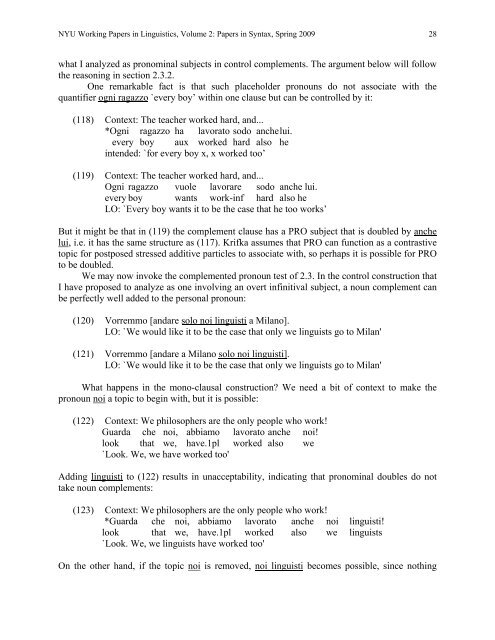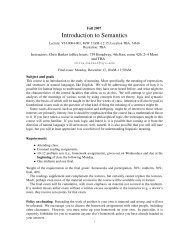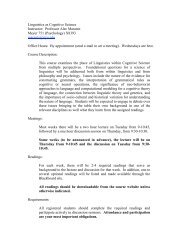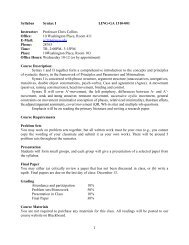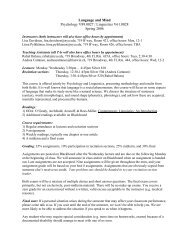Overt Nominative Subjects in Infinitival Complements Cross - NYU ...
Overt Nominative Subjects in Infinitival Complements Cross - NYU ...
Overt Nominative Subjects in Infinitival Complements Cross - NYU ...
You also want an ePaper? Increase the reach of your titles
YUMPU automatically turns print PDFs into web optimized ePapers that Google loves.
<strong>NYU</strong> Work<strong>in</strong>g Papers <strong>in</strong> L<strong>in</strong>guistics, Volume 2: Papers <strong>in</strong> Syntax, Spr<strong>in</strong>g 2009 28what I analyzed as pronom<strong>in</strong>al subjects <strong>in</strong> control complements. The argument below will followthe reason<strong>in</strong>g <strong>in</strong> section 2.3.2.One remarkable fact is that such placeholder pronouns do not associate with thequantifier ogni ragazzo `every boy’ with<strong>in</strong> one clause but can be controlled by it:(118) Context: The teacher worked hard, and...*Ogni ragazzo ha lavorato sodo anche lui.every boy aux worked hard also he<strong>in</strong>tended: `for every boy x, x worked too’(119) Context: The teacher worked hard, and...Ogni ragazzo vuole lavorare sodo anche lui.every boy wants work-<strong>in</strong>f hard also heLO: `Every boy wants it to be the case that he too works’But it might be that <strong>in</strong> (119) the complement clause has a PRO subject that is doubled by anchelui, i.e. it has the same structure as (117). Krifka assumes that PRO can function as a contrastivetopic for postposed stressed additive particles to associate with, so perhaps it is possible for PROto be doubled.We may now <strong>in</strong>voke the complemented pronoun test of 2.3. In the control construction thatI have proposed to analyze as one <strong>in</strong>volv<strong>in</strong>g an overt <strong>in</strong>f<strong>in</strong>itival subject, a noun complement canbe perfectly well added to the personal pronoun:(120) Vorremmo [andare solo noi l<strong>in</strong>guisti a Milano].LO: `We would like it to be the case that only we l<strong>in</strong>guists go to Milan'(121) Vorremmo [andare a Milano solo noi l<strong>in</strong>guisti].LO: `We would like it to be the case that only we l<strong>in</strong>guists go to Milan'What happens <strong>in</strong> the mono-clausal construction? We need a bit of context to make thepronoun noi a topic to beg<strong>in</strong> with, but it is possible:(122) Context: We philosophers are the only people who work!Guarda che noi, abbiamo lavorato anche noi!look that we, have.1pl worked also we`Look. We, we have worked too'Add<strong>in</strong>g l<strong>in</strong>guisti to (122) results <strong>in</strong> unacceptability, <strong>in</strong>dicat<strong>in</strong>g that pronom<strong>in</strong>al doubles do nottake noun complements:(123) Context: We philosophers are the only people who work!*Guarda che noi, abbiamo lavorato anche noi l<strong>in</strong>guisti!look that we, have.1pl worked also we l<strong>in</strong>guists`Look. We, we l<strong>in</strong>guists have worked too'On the other hand, if the topic noi is removed, noi l<strong>in</strong>guisti becomes possible, s<strong>in</strong>ce noth<strong>in</strong>g


